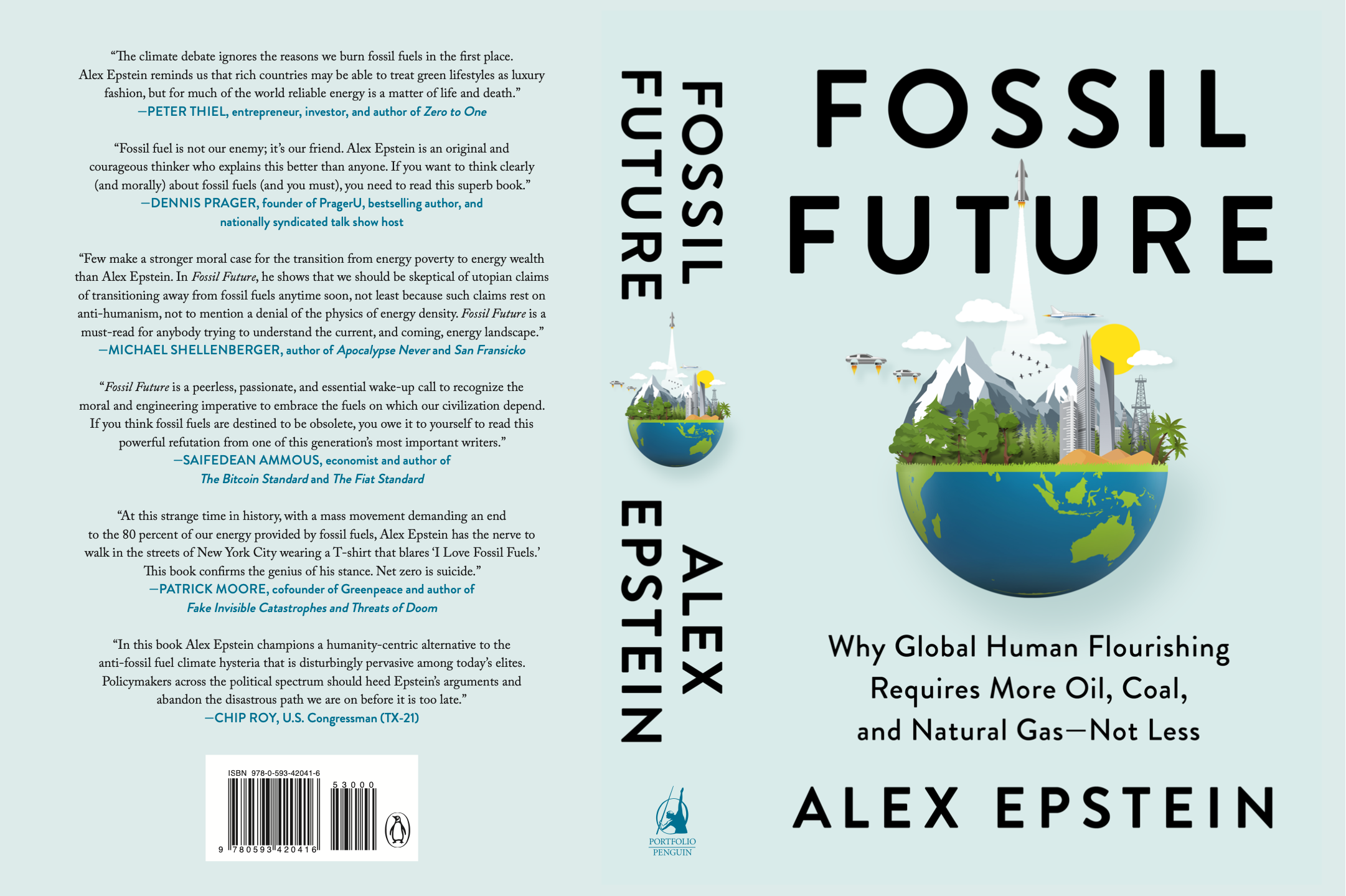Originally published: October 08, 2025
This is the second of 11 “Alex Notes” on my book Fossil Future—like Cliff’s Notes, but actually written by the author. (Read the first one here.)
(Also, for those who preordered Fossil Future or who are premium subscribers to this newsletter, I’m doing a special live event “How to talk to anyone about climate change” on October 23. The invite will come to you later this week.)
The mainstream “knowledge system” has an unrepentant track-record of catastrophizing the side-effects of fossil fuels: wildly overpredicting negative side-effects and ignoring our ability to master them.
(A summary of Fossil Future, Chapter 2)
-
Not only does our “knowledge system”—the people and institutions we rely upon to research, synthesize, disseminate, and evaluate expert knowledge—consistently ignore the massive benefits of fossil fuels, it also consistently catastrophizes the side-effects of fossil fuels.
-
Our Knowledge System’s Real Track Record on Climate: 180 Degrees Wrong
The mainstream knowledge system has predicted far faster warming than has occurred, and has predicted a massive increase in climate-related disaster deaths when these deaths have dramatically decreased.1
-
In 1989, AP News reported climate predictions from New York office director of the UN Environmental Programme, Noel Brown, including that “entire nations could be wiped off the face of the Earth by rising sea levels if the global warming trend is not reversed by the year 2000.”2
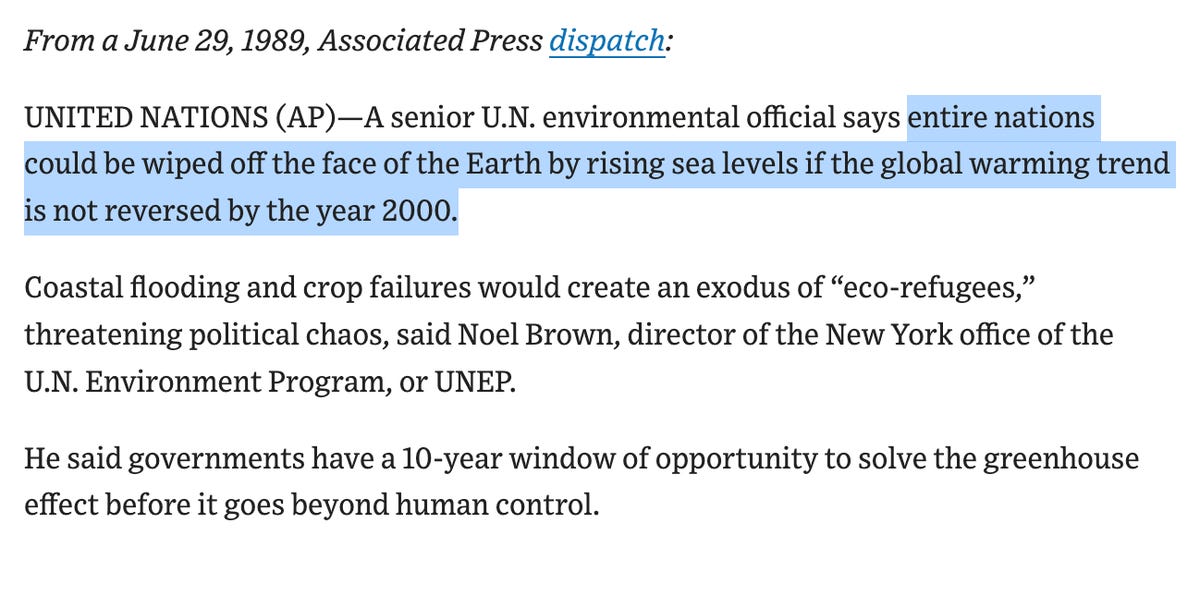
-
The Error of Catastrophizing
The 180-degree wrong prediction of increasing climate-related disaster deaths was the result of the error of catastrophizing, which consists of:
1) dramatically overstating a negative side-effect
2) ignoring our ability to master that side-effect -
The “Expert” Prediction of Rapid Catastrophic Global Cooling
Our knowledge system, before it publicized predictions of rapid/deadly global warming, publicized designated expert predictions of rapid/deadly global cooling—in both cases in contradiction to most experts’ views.
-
Many of the same trusted news institutions that today are warning us about catastrophic global warming—e.g., The Guardian, The New York Times, Newsweek—were in the 1970s warning us about catastrophic global cooling!3
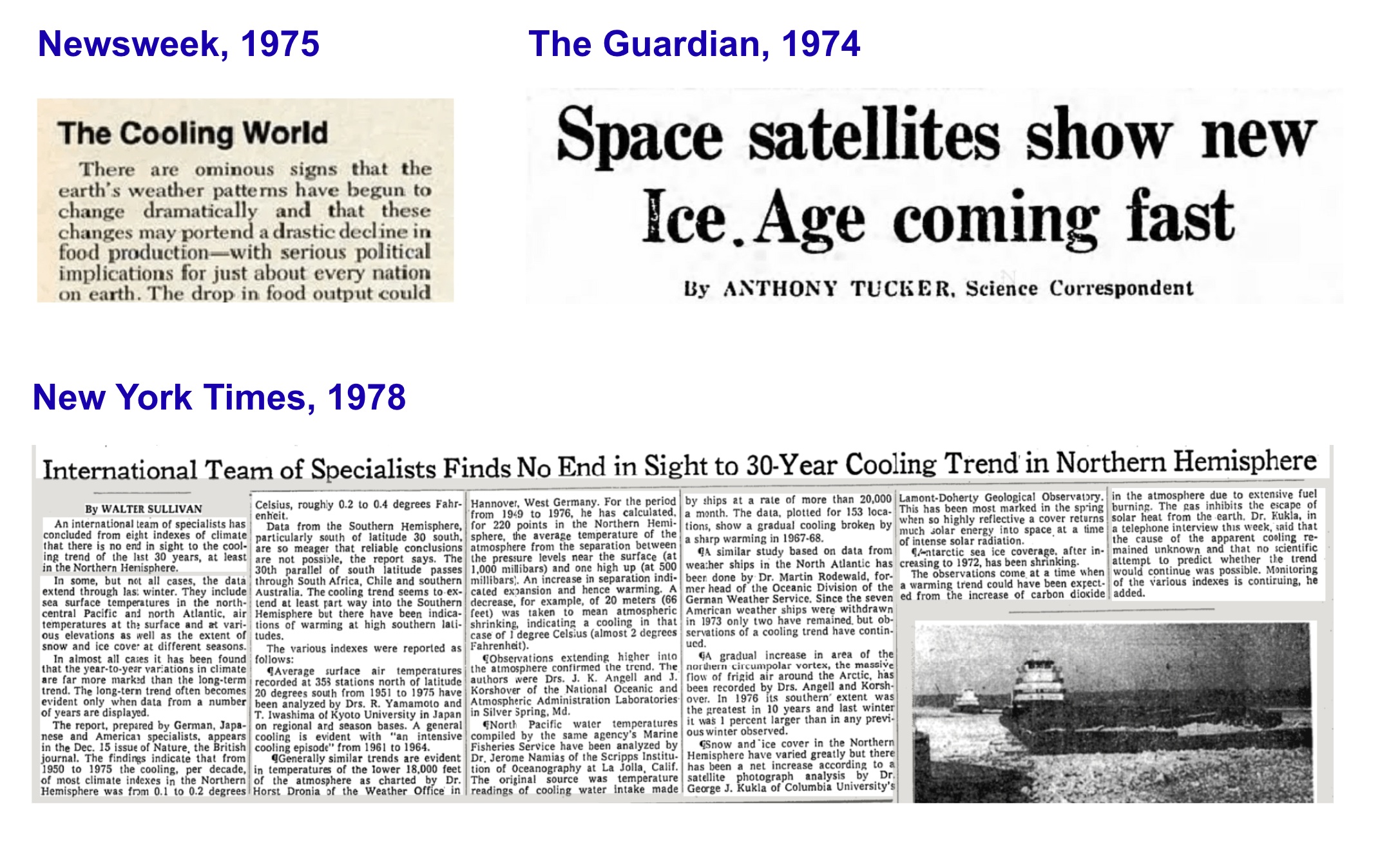
-
Catastrophizing Resources
**Our knowledge system has a track record of catastrophizing resource availability—**predicting catastrophic resource depletion of fossil fuels and other resources when in fact fossil fuel machine labor produced unprecedented availability of all resources.
-
“Expert” Paul Ehrlich catastrophizing resource availability in 1971:
“By the year 2000 the United Kingdom will be simply a small group of impoverished islands, inhabited by some 70 million hungry people... I would take even money that England will not exist in the year 2000.”4
-
Catastrophizing Environmental Quality
Our knowledge system has a track record of catastrophizing environmental quality—predicting unlivably bad air and water when in reality human beings improved air quality, including through reducing fossil fuels’ harmful emissions.
-
Designated expert Kenneth Watt catastrophizing environmental quality in 1970:
“At the present rate of nitrogen buildup, it’s only a matter of time before light will be filtered out of the atmosphere and none of our land will be usable.”5
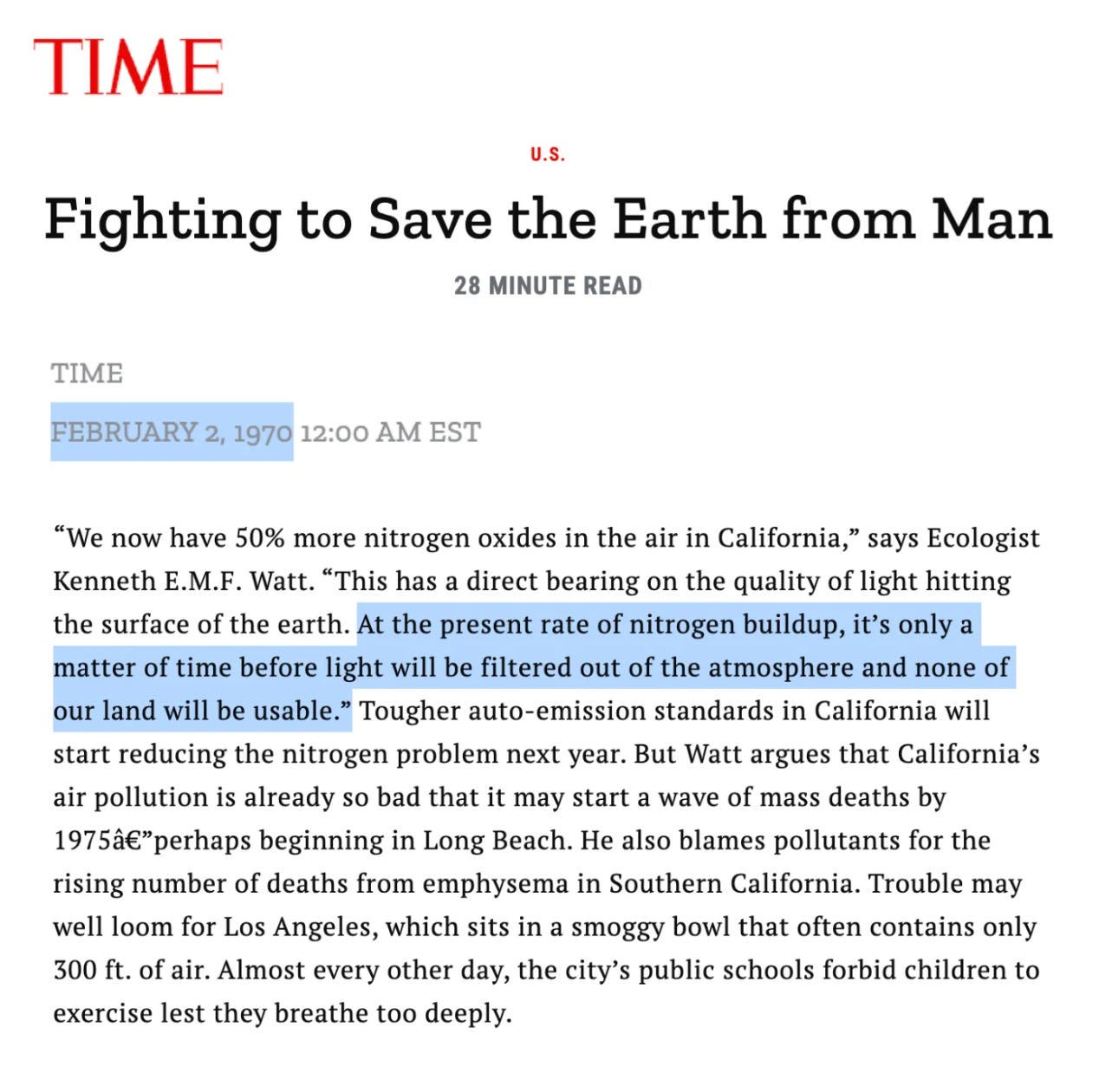
-
Catastrophizing Nuclear Energy
Our knowledge system has a track record of catastrophizing nuclear—the most promising competitor to fossil fuels with side-effects that experts recognize as masterable—revealing a broader pattern of catastrophizing cost-effective energy as such.
-
Nuclear has been so successfully catastrophized by our knowledge system that it is virtually criminalized.
The extremely safe levels of radiation are treated as so dangerous and thus requiring so many costly “safety” requirements that cost-effective nuclear is almost impossible.
-
An Uncorrected Failure
Instead of acknowledging its track record of catastrophizing fossil fuels, the mainstream knowledge system has been unrepentant and in fact elevated the catastrophizing designated experts to new heights of influence.
-
According to designated expert Bill McKibben in 2009, “Every time we thought we understood something about climate, the truth has turned out to be worse than we thought.”
And seven years later, “The numbers on global warming are even scarier than we thought.”6
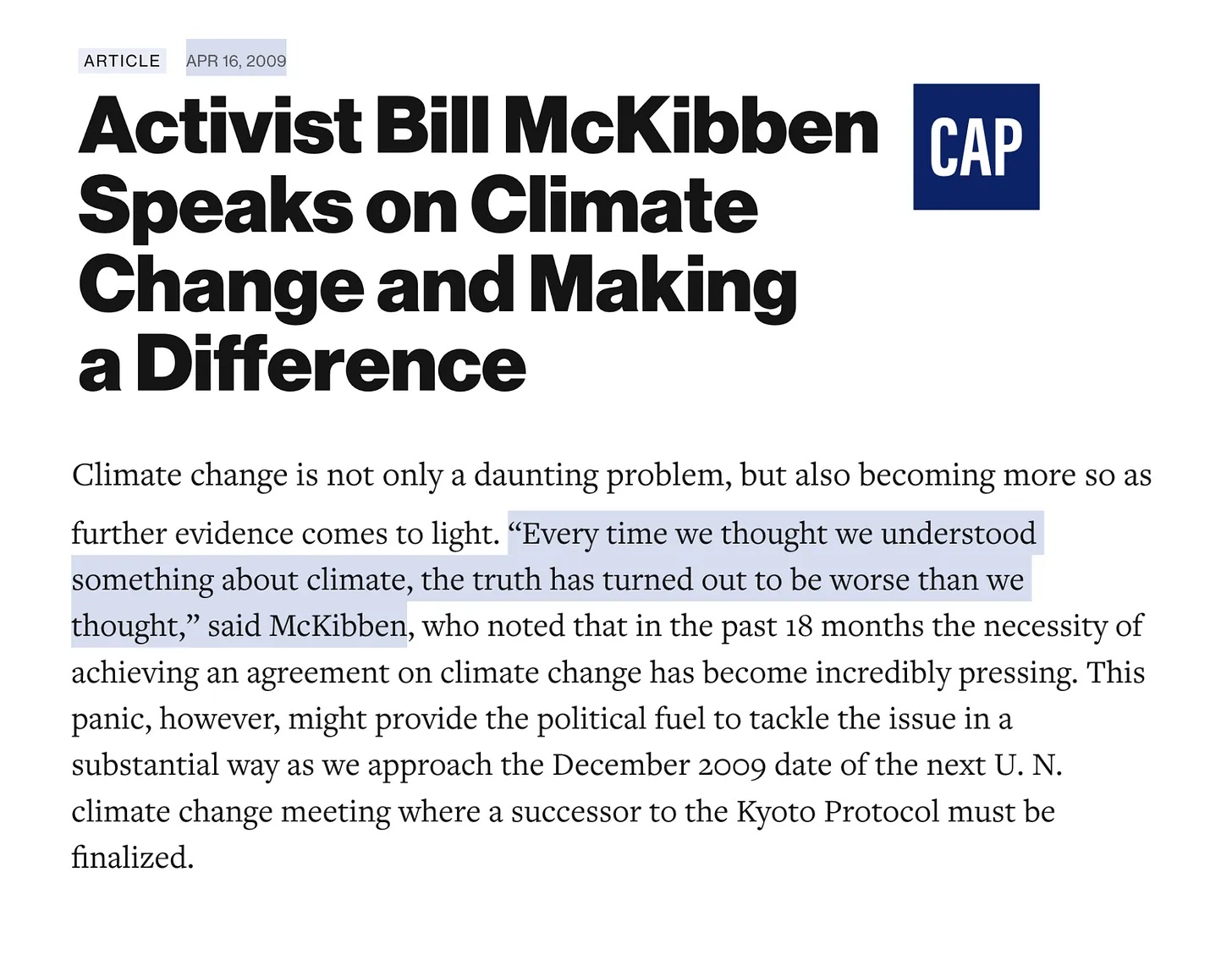
-
Deadly Prescriptions
Our knowledge system’s proven, uncorrected willingness to ignore the massive benefits of fossil fuels and catastrophize side-effects means it is fully capable of prescribing the rapid elimination of fossil fuels even if this would be catastrophic.
-
In 1998, “expert” Bill McKibben endorsed a scenario of outlawing 60% of fossil fuel use to slow catastrophic climate change, even though that would mean that each human would only get to produce enough CO2 to, in his words, “drive an average American car nine miles a day.”7
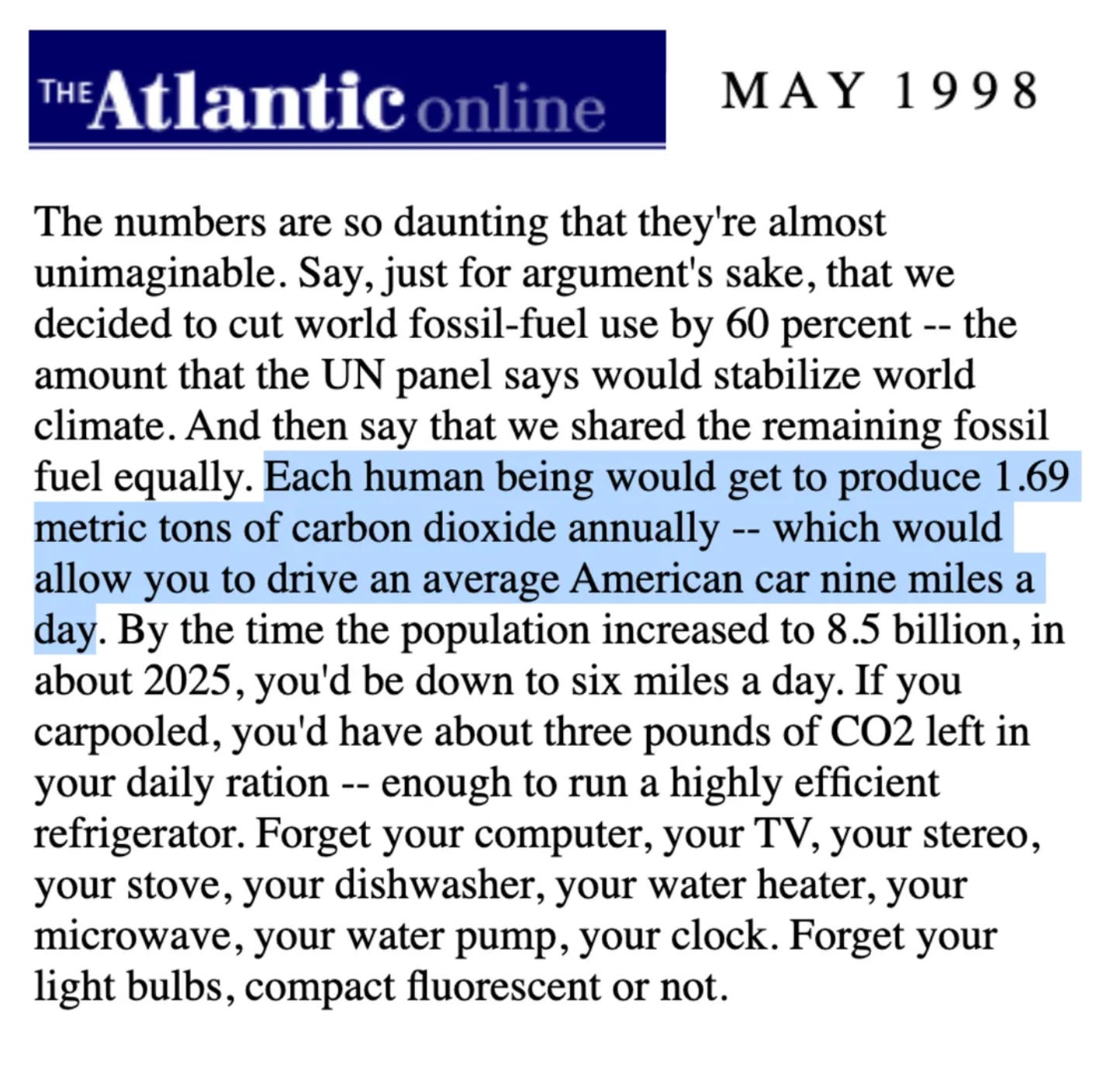
-
Our Missing Protection
While in the past we were protected from calls for eliminating fossil fuels because our knowledge system significantly valued cost-effective energy, today’s knowledge system as a whole ignores fossil fuels’ benefits—meaning we have no such protection.
-
Fossil fuel elimination policies of going “net zero,” “fossil free,” and “100% renewable” were just a decade ago considered idealistic if not crackpot policies most prominently advocated by Bill McKibben.
Today they are the dominant policy idea in most of the world.
-
Understanding Both Our Knowledge System’s Energy Failure and Ours
To know the right path forward on fossil fuels we need to understand how our knowledge system has come to oppose cost-effective energy based on (irrationally) ignoring benefits and catastrophizing side-effects.
Coming next week: A summary of Chapter 3 of Fossil Future, “The Anti-Impact Framework”
References
-
Roy Spencer - Global Warming: Observations vs. Climate Models
Roger Pielke Jr. - Human Progress versus Climate Evangelism↩
-
Geoff Chambers - Guardian Archive (4): The Missing Years
-
Paul R. Ehrlich - The End of Affluence (Riverside Press, 1974)↩
-
American Progress - Activist Bill McKibben Speaks on Climate Change and Making a Difference↩
